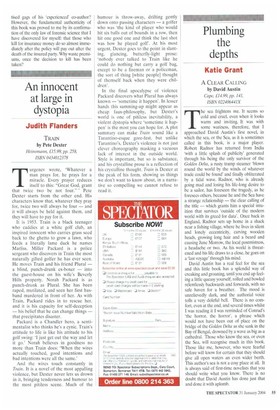An innocent at large in dystopia
Judith Flanders
TRAIN by Pete Dexter Heinemann, .115.99, pp, 258, ISBN 0434012378 Turgency wrote, 'Whatever a man prays for, he prays for a miracle. Every prayer reduces itself to this: "Great God, grant that twice two be not four." ' Pete Dexter starts from the other end. His characters know that, whatever they pray for, twice two will always be four — and it will always be held against them, and they will have to pay for it.
It is 1953. Train is a black teenager who caddies at a white golf club, an inspired innocent who carries grass seed back to the ghetto to grow a lawn, who feeds a literally lame duck he names Marliss. Miller Packard is a police sergeant who discovers in Train the most naturally gifted golfer he has ever seen. He moves Train and his friend Plural — a blind, punch-drunk ex-boxer — into the guest-house on his wife's Beverly Hills property, Norah Packard is as punch-drunk as Plural. She has been raped, mutilated, and seen her first husband murdered in front of her. As with Train, Packard rides in to rescue her, and it is his capacity for self-deception — his belief that he can change things — that precipitates disaster.
Packard is a Chandler hero, a sentimentalist who thinks he's a cynic. Train's attitude to life is like his attitude to his golf swing: 'I just get out the way and let it go.' Norah believes in goodness no more than Train does: 'When the wires actually touched, good intentions and bad intentions were all the same.'
And the wires touch constantly in Train. It is a novel of the most appalling violence, but Dexter never lets us drown in it, bringing tenderness and humour to the most pitiless scene. Much of the
humour is throw-away, drifting gently down onto passing characters — a golfer who was 'the kind of player who would hit six balls out of bounds in a row, then hit one good one and think the last shot was how he played golf'. At his most urgent, Dexter goes to the point in slanting, glancing, butterfly-light prose: 'nobody ever talked to Train like he could do nothing but carry a golf bag, except to be a fireman or a policeman, the sort of thing [white people] thought of themself back when they were children'.
In the final apocalypse of violence Packard discovers what Plural has always known — 'sometime it happen'. In lesser hands this summing-up might appear as cheap faux-philosophy, but Dexter's world is one of pitiless inevitability, a violent dystopia where 'sometime it happen' is the most you can hope for. A plot summary can make Train sound like a Tarantino-esque gore-fest, but unlike Tarantino's, Dexter's violence is not just clever choreography masking a vacuous lack of interest in the outside world. Style is important, but so is substance, and his crystalline prose is a reflection of his crystalline thought. Train is Dexter at the peak of his form, showing us things we don't want to know about, in a narrative so compelling we cannot refuse to read it.




























































































 Previous page
Previous page